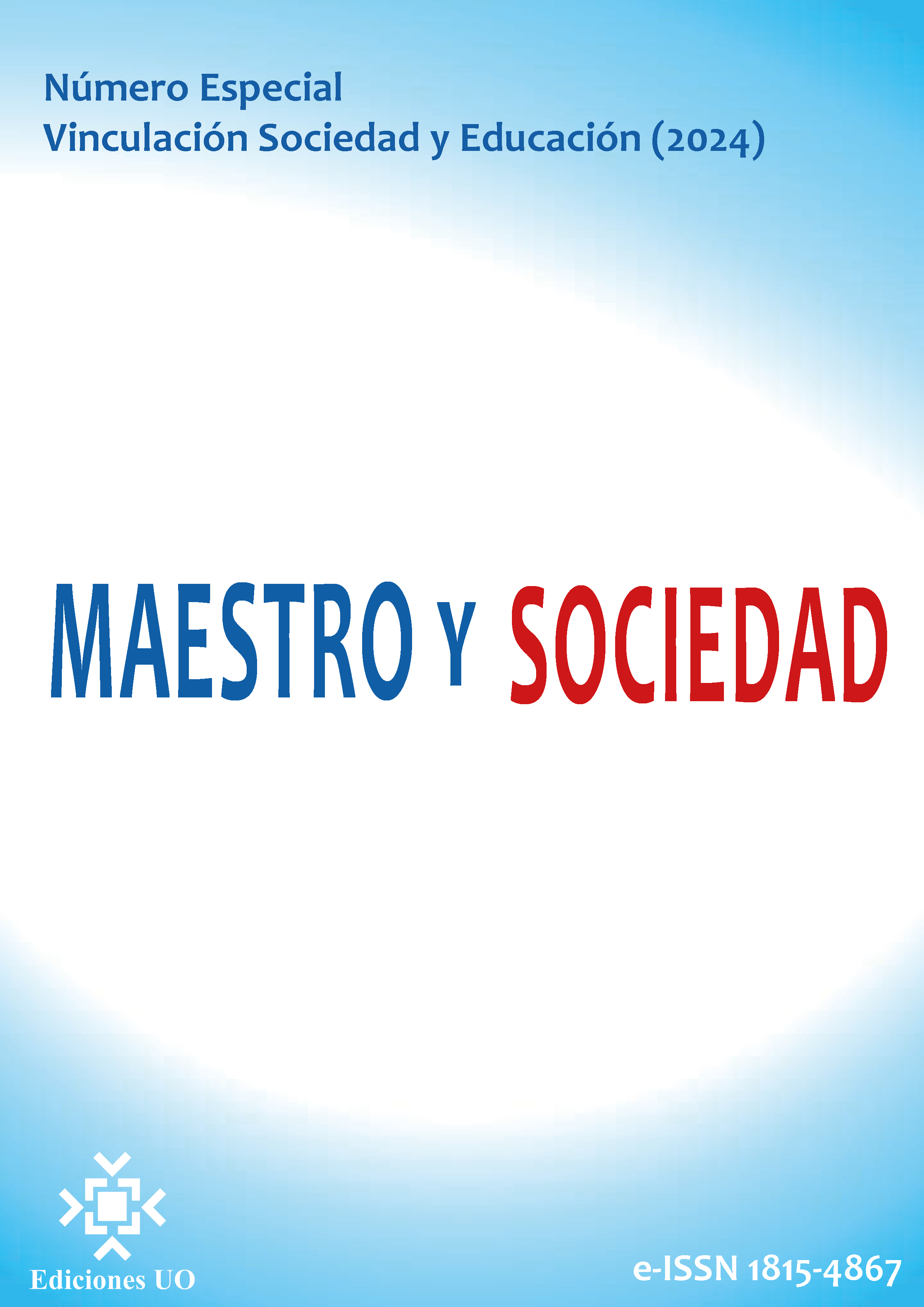El proceso histórico pedagógico de la educación de Primera Infancia en Santiago de Cuba desde 1902 hasta 2010
Palavras-chave:
estrategia; formación; infancia; procedimientos; legitimaciónResumo
Introducción: El rescate de las raíces histórico-pedagógicas brinda un sistema de conocimientos a la pedagogía cubana que le permite una reconstrucción de periodos importantes por los que ha atravesado la educación. Las investigaciones que se desarrollan sobre la historia de la educación están llamadas a enfatizar más en los estudios locales o territoriales, en sus particularidades, sin olvidar la relación entre lo general histórico-pedagógico nacional y lo particular histórico-pedagógico regional. Teniendo en cuenta lo anterior, se tiene como objetivo elaborar de una estrategia pedagógica para el estudio del proceso histórico-pedagógico de la educación de la primera infancia en Santiago de Cuba desde 1902 hasta 2010. Materiales y métodos: Para la sistematización fueron empleados métodos y técnicas de investigación del nivel teórico, empírico y matemático, tales como: análisis y síntesis; inducción-deducción; histórico-lógico. A su vez se utilizó la modelación como instrumento de carácter material-teórico de la investigación que posibilita la reproducción de la parte de la realidad objetiva estudiada; el método sistémico-estructural. Resultados: La estrategia pedagógica de implementación de la sistematización del proceso histórico-pedagógico de la educación de la primera infancia local se constituye en herramienta que viabiliza el método de legitimación y sus procedimientos sistematizadores en la formación de pregrado de los estudiantes de la carrera Licenciatura en Educación. Preescolar. A su vez, la valoración de la efectividad de la estrategia pedagógica reveló una tendencia satisfactoria en el desarrollo de las principales transformaciones en los modos de actuación que ocurren en el proceso de formación de pregrado de los estudiantes, según exigencias del modelo del profesional. Discusión: El proceso histórico-pedagógico de la educación de la primera infancia en Santiago de Cuba ha sido estudiado, de manera general, por investigadores del territorio, aunque se evidencian limitaciones en las vías y procedimientos sistematizadores del devenir histórico-pedagógico de dicho nivel educativo. Conclusiones: La estrategia pedagógica favorece el tratamiento a las estrategias curriculares del perfeccionamiento del uso de la lengua materna, computación, historia de Cuba, historia de la profesión, la formación pedagógica; entre otras, así como la consecución del encargo social de la carrera: la formación integral del profesional de la educación de la primera infancia.
Referências
Benavides Perera, Z. (2006). Tendencias del desarrollo de las ideas sobre la educación del niño preescolar cubano de 1959- 2000. [Tesis de doctorado. ISP ‘’Enrique José Varona’’].
Cruz Cruz, C. L. (2007). Sistematización histórica de las transformaciones en el desarrollo de la Educación Preescolar después del triunfo de la Revolución en la provincia de Villa Clara. [Tesis de doctorado. ISP ‘’Félix Varela’’].
Heredia Heredia, R. M. (2014). Un acercamiento a la Historia de la Educación Preescolar en Santiago de Cuba. Maestro y Sociedad, 11(2). http://maestroysociedad.uo.edu.cu
Heredia Heredia, R. M. (2015a). La formación del educador preescolar para la atención a la primera infancia en Santiago de Cuba. [Ponencia. Taller Científico Nacional Maestro y Sociedad].
Heredia Heredia, R. M. (2015b). La institucionalización de la Educación Preescolar en Santiago de Cuba desde 1902-2014. Maestro y Sociedad, 12(3). http://maestroysociedad.uo.edu.cu
Heredia Heredia, R. M. (2015c). La sistematización del proceso histórico-pedagógico y su expresión en la cultura histórico-pedagógica en la formación inicial. Maestro y Sociedad, 12(3). http://maestroysociedad.uo.edu.cu
Jara, O. (1998). ¿Cómo sistematizar? En Selección de Lecturas de Metodología de la Investigación Educativa. Editorial Pueblo y Educación.
Miranda Vázquez, A. (2005). Evolución histórico- educacional y pedagógica de la formación del maestro primario en Cuba, desde 1898 hasta 1952. [Tesis de doctorado. ISP ‘’Frank País García’’].
Parra Vigo, I. V. (2002). Modelo didáctico para contribuir a la dirección del desarrollo de la competencia didáctica del profesional de la Educación en formación inicial. [Tesis de doctorado. ISP ‘’Enrique José Varona’’].
Ramos Romero, G. (2003). Las concepciones pedagógicas que fundamentaron la práctica educativa en Santiago de Cuba durante la República neocolonial (1902-1958). [Tesis de doctorado. ISP ‘’Frank País García’’].
Siverio Gómez, A. M. (2006). Reseña histórica de las ideas educativas acerca de la educación preescolar en Cuba. En Lecturas para educadores preescolares. (Tomo IV). Editorial Pueblo y Educación.
Publicado
Como Citar
Edição
Seção
Licença
Copyright (c) 2024 Rosa María Heredia Heredia, Irelis de la Caridad Escalona Vázquez, Liyanet García Rodríguez

Este trabalho está licenciado sob uma licença Creative Commons Attribution-NonCommercial-NoDerivatives 4.0 International License.
Esta revista proporciona un acceso abierto inmediato a su contenido, basado en el principio de que ofrecer al público un acceso libre a las investigaciones ayuda a un mayor intercambio global de conocimiento. Cada autor es responsable del contenido de cada uno de sus artículos. Los artículos pueden ser inéditos o estar disponibles previamente en servidores de preprints reconocidos por la revista. Sin embargo, no se permite la duplicación de la publicación o traducción de un artículo ya publicado en otra revista o como capítulo de un libro.
This journal provides immediate open access to its content, based on the principle that providing the public with free access to research supports a greater global exchange of knowledge. Each author is responsible for the content of each of their articles. Articles may be previously unpublished or available on preprint servers recognized by the journal. However, duplication of publication or translation of an article already published in another journal or as a book chapter is not permitted.
Esta revista oferece acesso aberto imediato ao seu conteúdo, com base no princípio de que oferecer ao público acesso gratuito à pesquisa contribui para um maior intercâmbio global de conhecimento. Cada autor é responsável pelo conteúdo de cada um de seus artigos. Os artigos poderão ser inéditos ou estar previamente disponíveis em servidores de preprints reconhecidos pela revista. No entanto, não é permitida a duplicação de publicação ou tradução de artigo já publicado em outro periódico ou como capítulo de livro.



























 Universidad de Oriente
Universidad de Oriente 